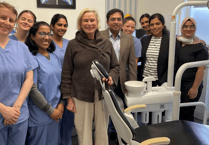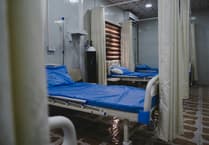Hospitals in the Wellington and West Somerset areas are trialling a new project to help lung cancer patients plan ahead for the future.
Patients with lung cancer are being encouraged to start thinking about the future while they’re in good health by nurse specialists at Musgrove Park and Yeovil hospitals
Angie Yarde, lead lung cancer clinical nurse specialist at Musgrove Park Hospital, says: “The prognosis for our lung cancer patients is not always good, sadly, so it’s vital that they start thinking about their future care as soon as possible, rather than leaving it until they’re too unwell.
“I feel that it’s really important that patients aren’t just sent an impersonal letter about whether they’ve thought about the future. It’s much better to use those in-person or telephone conversations we have with them on a regular basis, as an opportunity to talk about what can be a difficult subject.
“A letter was carefully designed, which we sought feedback from a number of community ‘Death Cafés’, and trialled giving this to patients, alongside a conversation about advance care planning.
“There are so many things included in the letter that people just don’t always think about, not just the bigger things like funerals and wills, but also the smaller practical things like computer passwords.
“During the trial we did a follow-up call with the patients a couple of weeks after they had the letter,” Angie continues.
“A lot of patients can get really anxious even thinking and talking about the future, and that’s very much the starting point of what we’re trying to achieve.
“I think the beauty of this letter is that it can reduce the anxiety for the patient, because once you’ve thought about it and written it down, and let your loved ones know, then it’s no longer something you need to worry about.
“We recognise we are in the early stages of providing this information, but know with time and experience, this important service will greatly enhance patients and their loved ones’ quality of life beyond the diagnosis.”
Miss Jo Morrison, a consultant gynae-oncologist and the co-chair of a trust-wide group set up to discuss end-of-life care, says: “This project first came about because there we were starting to see a rise in the number of people requesting emergency weddings, with our colleagues being asked to witness wills when people were extremely unwell.
“These have major legal and family implications, especially if done in a hurry when someone might not be well enough to consent to these major life events.
“Helping people to leave their affairs in good order is a kindness to those they leave behind and can help the bereavement process.
“It was interesting that the major feedback we had was that 'I wish I’d had this earlier' which encouraged our lung cancer nurse specialist team to be braver and have these important conversations earlier in someone’s illness.”





Comments
This article has no comments yet. Be the first to leave a comment.